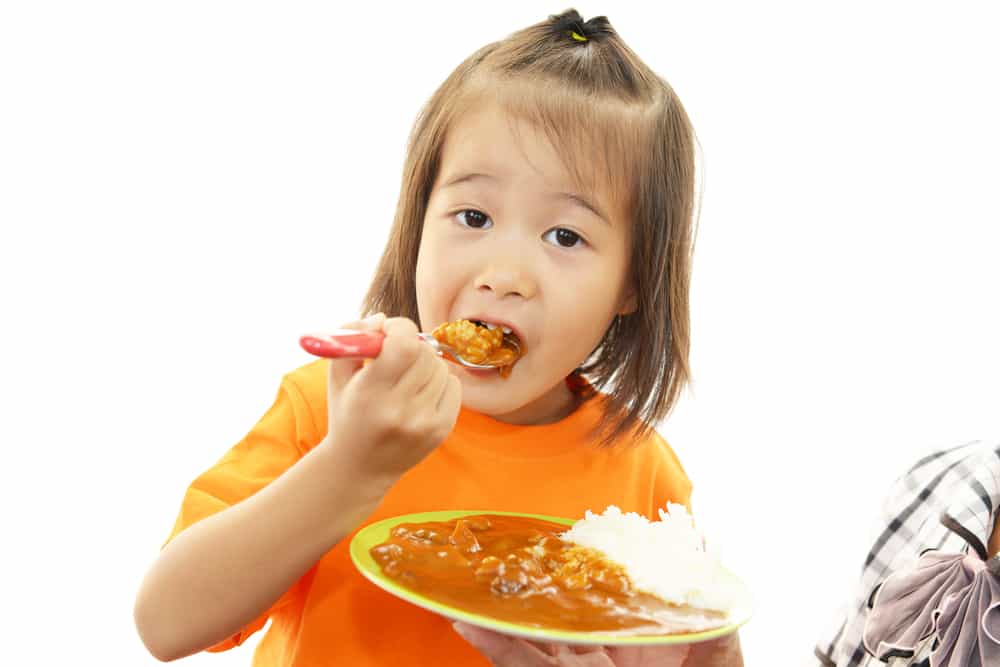Contents:
Medical Video: Kids Try Spicy Food from Around the World | Kids Try | HiHo Kids
We live in a society where people think baby food must be bland and soft. Many babies are ready for solid food from the age of 4 to 6 months, and parents often turn to traditional solid foods such as baby cereal and other baby porridge. Bland food is not bad for babies, but consuming too much food can prevent them from getting important nutrients and cause children to become picky eater.
Dr David Ludwig, a pediatric nutrition specialist from Boston Children's Hospital, was quoted from NBC News as saying that several studies show that rice and other wheat cereals that go through complicated manufacturing processes could be one of the worst foods for babies. "This food in certain aspects is not much different from adding sugar to formula milk. They digest very quickly in the body into sugar, increase blood sugar and insulin "and can cause later health problems, including obesity, he said.
Can small children eat spicy food?
Actually, it doesn't only have to give children bland food with the reason that they are afraid to cause allergies or make children become stomachache. "The idea that babies should eat only tasteless food is a myth that has somehow become our cultural norm," said Susanna Block, a pediatrician from Seattle and owner of World Baby Foods, a baby food company, reported by the Baby Center. "There is absolutely no science behind it."
So, don't be afraid to try to provide spicy food for children. "Children want to eat good food too, just like adults," said Kristi Raja, senior nutritionist at Texas Children's Hospital and spokesperson for the Academy of Nutrition and Dietetics.
Seasoning children's food with herbs and spices can help enrich his tongue palette to recognize and receive various flavors as he grows older, also giving him a good supply of antioxidant properties - provided you know the limits.
When can you start giving spicy food to children?
There is a difference between spicy and aromatic spices. Aromatic herbs - such as cinnamon, nutmeg, garlic, turmeric, ginger, coriander and cumin - may be allowed to be introduced to the child early, even after he reaches 6 months. So, sprinkle a pinch of cinnamon powder into the oats of your little one, for example, or add a small amount of mashed garlic to paste during lunch later. (Don't add salt or sugar!)
But wait for at least one year before you introduce stronger spices in your child's diet, such as curry or chili. Children less than one year old have just gotten used to basic foods and are still very susceptible to food reactions and sensitivity. The spicy taste of spicy food is not part of the taste, but involves stimulation of pain receptors, and the baby may have a stronger and more foreign reaction to the stimulation, which might create reluctance.
There are pain receptors on the tongue and in the intestine that are stimulated by spicy and hot food - specifically the potential vanilloid-1 transient receptor (TRPV-1) in the intestine. Capsaicin - the active ingredient in chili which makes it feel spicy - works by stimulating pain receptors. This is what creates a sensation of heat on the tongue, pain in the intestine, and in some people, pain and heat around the perianal area during bowel movements. People who have irritable bowel syndrome (IBS) can have a bad reaction to spicy food as a result of this receptor stimulation. Gastroenterology experts argue that pain receptors in children are more active than adults.
On the other hand, behavioral psychologist Alexandra W Logue, quoted by the Independent, argues, "The pain that accompanies spicy food seems dangerous, but it is actually safe." Plus, many experts claim that children over 6 months can handle almost most taste sensations, with a few limitations: Be careful if you have a family history of allergies; introduce one food at a time and observe it for any potential problems; and make sure your food doesn't make it choke.
What if the nursing mother eats spicy?
The myth that says "babies can feel what their mothers eat" is indeed supported by scientific evidence. Babies in the womb and those who are breastfed exclusively can feel - and adapt to - what you eat.
Some experts believe you might have raised your child's tolerance for spicy things, and he would be more likely to like spicy food after they are weaned if you eat spicy food while breastfeeding. This is because breast milk can change taste, depending on the mother's diet. The traces and foods that you enjoy are absorbed into your milk.
Introduce children with spicy food gradually
There is no specific list of spices that young children should avoid. If the child shows a negative reaction, intolerance, fuss, or does not like when introduced to spicy food, then avoid the food.
When you introduce a strong flavor of spices, make small portions of food that your child can tolerate. That way, if he complains of stomach pain, you will be able to identify the cause - and be able to avoid it in the future.
Also think about how your little one usually reacts to new foods. If your child is sensitive to new foods, continue the food with a tastier taste for a while. Although it rarely triggers food allergies, spicy foods can irritate the digestive system and cause stomach acid reflux.
But, there is no reason not to offer spicy food for children and think that something spicy has a higher risk of harm to babies than to adults. The digestive capacity of a normal baby immediately after birth, so that the difference in appetite is only a difference in taste, and its ability to chew. After they get used to solid food, they will be fine with spicy food. For most people who experience indigestion when eating spicy food, spices are generally not the main cause, but are oils contained in spicy foods.
From a security standpoint, make sure to use fresh spices that have not been stored on the shelf for three or five years. People tend to store kitchen spices on a shelf for a long period of time, and then there are things that develop in them. If you want to provide spicy food for your child, check the expiration date.
Of course, the final decision comes to the choice of each parent. If the thought of providing balado eggs to your toddler worries you, you are not alone. Do what you think is good for you and your child.
READ ALSO:
- Various Benefits of Kale Leaves, The Green which is Rich in Nutrition
- Ways to Serve Tofu or Tofu as Baby Food
- Foods to Avoid When Children Are Constipated












